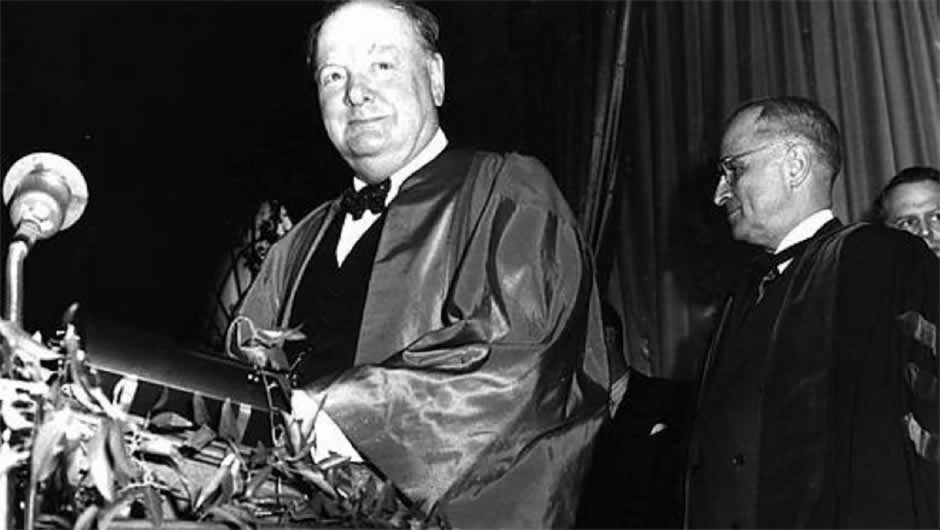The surprise defeat of Winston Churchill’s Conservative party after the end of World War II had the benefit of releasing him from the need to be diplomatic.
When Harry S. Truman invited him to speak at a college in the presidents home stale of Missouri. Churchill took full advantage of the occasion to speak frankly about the future of Europe.
“We welcome Russia to her rightful place among the leading nations of the world. We welcome her flag upon the seas. Above all, we welcome constant, frequent and growing contacts between the Russian people and our own people on both sides of the Atlantic. It is my duty however, for I am sure you would wish me to state the facts as I see them to you, to place before you certain facts about the present position in Europe.
Winston Churchill 5th March 1946
From Stettin in the Baltic to Trieste in the Adriatic, an iron curtain has descended across the Continent. Behind that line lie all the capitals of the ancient states of Central and Eastern Europe: Warsaw, Berlin, Prague, Vienna. Budapest, Belgrade, Bucharest and Sofia, all these famous cities and the populations around them lie in what I must call the Soviet sphere, and all are subject in one form or another, not only to Soviet influence but to a very high and, in many cases, increasing measure of control from Moscow;
Athens alone – Greece with its immortal glories – is free to decide its future at an election under British, American and French observation. The Russian-dominated Polish Government has been encouraged to make enormous and wrongful inroads upon Germany, and mass expulsions of millions of Germans on a scale grievous and undreamed-of are now taking place.
The Communist parties, which were very small in all these Eastern Stares of Europe, have been raised to pre-eminence and power far beyond their numbers and are seeking everywhere to obtain totalitarian control. Police governments are prevailing in nearly every case, and so far, except in Czechoslovakia, there is no true democracy.”
From his dealings with his Russian allies during the war, Churchill could see which way the wind was blowing in a post-war Europe, The spread of communist totalitarianism was. he believed, no less dangerous to peace than Hitler’s national socialism.
The only way to avert a third world war was to maintain preparedness in peace. But after punishing conflicts in Europe and Asia, war-weary military and Civilian populations in both Britain and America were reluctant to confront the possibility of a new threat from ‘good oh Uncle Joe’ Stalin.
Churchill knew that his view would be unwelcome, and crafted his speech with even greater care than usual It was said that even minute of a Churchill speech took an hour to write, and this one took the best part of two weeks, including the five days spent on a liner crossing the Atlantic Ocean to the States. He showed it to Truman in advance, and to members of Truman’s administration, who recommended minor changes.
But it was only on the eve of his address, in search of evocative imagery for his ideas, that he hit upon the metaphor of an iron curtain marking the boundary between enlightened Europe and the darkness of the Soviet sphere of influence. The following afternoon at Westminster College, Fulton, Missouri, he was introduced by the US president, whose own intelligence services now backed the British statesman’s analysis. “Mr Churchill and I believe in freedom of speech,” Truman said. “I understand Mr Churchill might have something useful and constructive to say.”
Churchill’s primary purpose was to affirm the special relationship between America and Britain that exemplified state democracy and which, along with the recently created United Nations, must form the basis of any lasting peace. This thought led naturally on to the threat to that peace and democracy: “war and tyranny. Prevention,” he said bluntly, “is better than cure ”
He welcomed their wartime ally Russia’s emergence onto the world stage but added: “It is my duty, however … to place before you certain facts about the present position in Europe. From Stettin in the Baltic to Trieste in the Adriatic, an iron curtain has descended across the Continent. Behind that line lie all the capitals of the ancient states of Central and Eastern Europe.”
He spoke in terms of light – “The dark ages may return”, “A shadow has fallen over the scenes so lately lighted by the Allied victory”, “War can find any nation, wherever it may dwell between dusk and dawn.” And he argued that a balance of power was nor enough that there must be superiority’ and preparedness even in peacetime, to hold the expansion of communist influence at bay.
Besides his great oratory, what gave Churchill’s speech such power was his insightful overview of an international stage, partly instinctive and partly the product of a long life in global politics. He knew that, although he was the bearer of bad news, his views would be received with respect.
In Russia, however, politicians blamed the speech for introducing suspicion into the USSR’s relationship with the West. It, therefore, marked the start of the Cold War, a struggle of espionage and counter-espionage that continues to this day.



